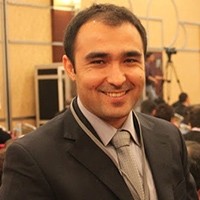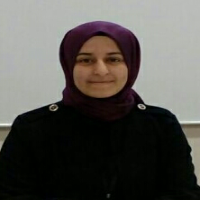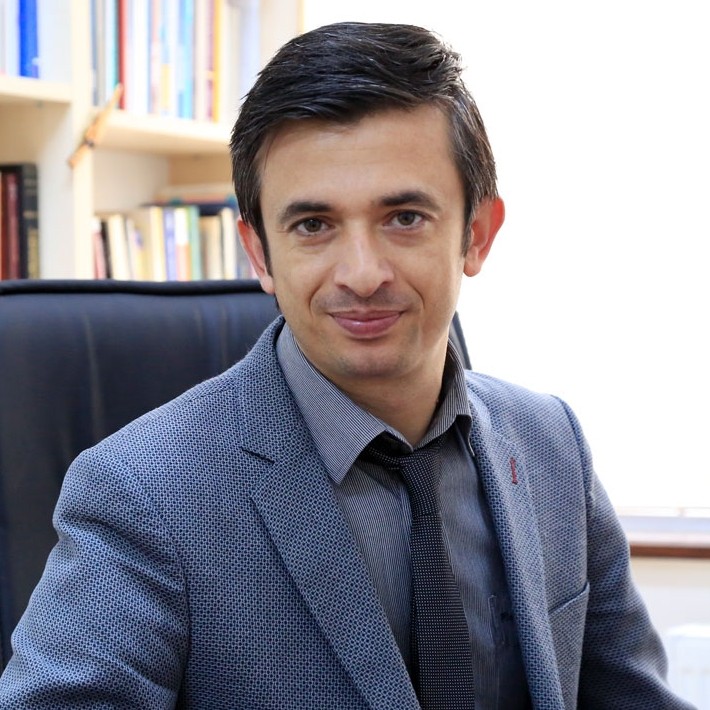Research Article
Review
Issue Editorial Board



Dilek Çetin has been an Associate Professor at Süleyman Demirel University since 2017. She received a B.Sc. from the Department of Economics at the Faculty of Political Sciences at Ankara University in 1998 and received a M.Sc. degree in Economics from Akdeniz University. In 2012, she received a Ph.D. degree in Economics from Middle East Technical University. Her dissertation was on knowledge spillovers and clusters with a spatial econometric application on Organized Industrial Districts. She was awarded the Ph.D. encouragement prize from the Turkish Economic Association. Her studies focus on regional economics, and research and innovation policies. In addition to these subjects she studies trade, entrepreneurship and gender issues. Econometric methods such as spatial econometrics, microeconometrics and panel data econometrics are used in her studies. She was a post-doctoral researcher for fifteen months at the Institute for Prospective Technological Studies (IPTS) in Seville, Spain, which is one of the seven institutes of the Joint Research Centre of Directorate-General of the European Commission.




Issue Reviewers







 Web
Web

Anıl Bölükoğlu, İzmir Bakırçay Üniversitesi'nde "Doktor Öğretim Üyesi" olarak görev yapmaktadır. Uzmanlık alanları arasında iktisadi büyüme ve eşitsizlik yer almaktadır.
Lisans eğitimini 2009 yılında Hacettepe Üniversitesi İktisat Bölümü'nde tamamlayan Dr. Bölükoğlu, yüksek lisans derecesini 2012 yılında Utah Üniversitesi İktisat Bölümü'nden almıştır. Doktora çalışmalarını Colorado Eyalet Üniversitesi'nde sürdürmüş ve 2017 yılında başarıyla tamamlamıştır.






Dr Marşap Gazi Üniversitesi Muhasebe-İşletme bölümünden mezun olduktan sonra 1987 yılında Gazi Üniversitesi Ticaret ve Turizm Fakültesinde araştırma görevlisi olarak akademik kariyerine başladı. Yüksek lisans ve doktorasını Gazi Üniversitesi Muhasebe Finansman Anabilim dalında tamamladı. 1991 yılında Dünya Bankası Projesi kapsamında İngiltere’de çalışmalar yaptı. 2002 yılında doçent, 2009 yılında profesör oldu. 2013 yılında Gazi Üniversitesi İİBF Uluslararası Ticaret bölümünde öğretim üyesi olarak çalıştı ve 2016-2018 yılları arasında bölüm başkanlığı görevini yürüttü. 2018 yılından itibaren Üniversitenin bölünmesiyle birlikte Ankara Hacı Bayram Veli Üniversitesi İİBF Uluslararası Ticaret ve Finansman bölümünde öğretim üyeliği devam etmektedir. Marşap lisans ve lisans üstü düzeyde dersler vermektedir.
Dr. Marşap üniversite bilimsel araştırma projeleri yanında Avrupa Birliği projelerinde de görev almış, mesleki yaşamı boyunca ulusal ve uluslararası kongre ve sempozyumlara katılarak bildiriler sunmuş ve ulusal ve uluslararası dergilerde makaleleri yayınlanmıştır. Dr Marşap IFRS, Finansal Muhasebe, Maliyet ve Yönetim Muhasebesi ve Sürdürülebilirlik Raporlaması alanlarında çalışmalar yapmaktadır. Dr. Marşap’ın yayınlanmış tek ve ortak yazarlı kitapları da bulunmaktadır.
Dr.Marşap 2015-2018 yılları arasında MÖDAV (Muhasebe Öğretim Üyeleri Bilim ve Dayanışma Vakfı) başkanlığı görevini üstlenmiştir. MÖDAV yönetim kurulu üyesidir.






1989 yılında Çankaya’da doğmuştur. Aslen Erzurumludur. İlk ve orta öğrenimi İstanbul Bahçelievler’de, lise eğitimini ise Ataköy Lisesi (Y.D.A)’nde tamamlamıştır. 2007 yılında Sakarya Üniversitesi İşletme Fakültesi İşletme Bölümü’nü kazanmış ve 2011 yılında mezun olmuştur. Akabinde kısa bir süre profesyonel çalışma hayatına devam etmiştir. 2013 yılında ise İstanbul Ticaret Üniversitesi İşletme Fakültesine araştırma görevlisi olarak atanmıştır. İstanbul Ticaret Üniversitesi’nde “Yerel Yönetimlerde Kurumsal Risk Yönetimi Uygulamalarının Analitik Hiyerarşi Süreci (AHP) Modeli ile İncelenmesi: İstanbul Büyükşehir Belediyesi (İBB) Örneği” başlıklı doktora tezini 2019 Ocak ayında tamamlayarak bilim doktoru unvanını kazanmıştır. 2022 Ocak ayında ise Üniversitelerarası Kurul’dan doçentlik unvanını almıştır. Halen İstanbul Ticaret Üniversitesi’nde İşletme Fakültesi öğretim üyesi ve Finans Enstitüsü müdürlüğü görevine devam etmektedir. Kurumsal risk yönetimi, kurumsal yönetim, denetim, iç kontrol, sürdürülebilirlik raporlaması, entegre raporlama konularında çalışmalar yapmaktadır.










Kübranur ÇEBİ KARAASLAN got her bachelor's, master's and doctorate degrees in the department of econometrics. She was appointed as an assistant professor at Erzurum Technical University, Department of Econometrics in 2021. She became an associate professor in 2022. Her main research interests are discrete choice model, categorical data, count data, microeconometrics, happiness economics, household expenditures, consumer behavior.
Skills & expertise
Applied Statistics • Microeconometrics • Data Analysis Discrete Choice Modeling • Survey Methodology and Data Analysis • Statistical Analysis. Tobit • Logistic Regression • Count Data • G*Power • Gompit Statistical Power and Power Analysis Quantile Regression

Mehmet Eren received his Bachelor's degree from Yıldız Technical University in 2012, his Master's degree from Marmara University in 2016 with his thesis titled "The European Union's Cyber Security Policy" and his PhD degree from Marmara University in 2023 with his thesis titled "Cyber Security Awareness in Banking Payment Systems: An Application on the Determinants of Awareness in the Turkish Banking Sector" at Marmara University in 2023. He continues his work in the field of cyber security both in his academic and professional life. In 2017, he published a book titled "European Union's Cyber Security Policy" published by Beta Publishing and in 2023, "Banking Payment Systems and Cyber Security" published by Nobel Publishing. He has articles, book chapters and conference papers published in international refereed journals. He holds Certified Information Systems Auditor (CISA), Certified Data Privacy Solutions Engineer (CDPSE), ISO 27001 Lead Auditor, ISO 22301 Lead Auditor, ITIL Foundation certificates and Capital Markets Board Licenses (Level 3, Information Systems Independent Audit, Corporate Governance Rating and Credit Rating).

Asst. Prof. Dr. Mehmet Sinan Çelik is a faculty member at the Department of Finance and Banking, Faculty of Economics and Administrative Sciences, Niğde Ömer Halisdemir University. He holds a Bachelor's degree in Finance and Banking from Giresun University and completed his Master's and Ph.D. degrees in Accounting and Finance at Niğde Ömer Halisdemir University. His research interests include capital markets, high-frequency trading, algorithmic trading strategies, behavioral finance, individual pension systems, and financial performance analysis. Dr. Çelik has published various articles, papers, and book chapters at national and international levels and has participated in several scientific projects as a researcher or advisor. He also serves as Vice Head of the Department and Erasmus Coordinator.




Yönetim ve Organizasyon
Havacılık Yönetimi
Sivas Cumhuriyet Üniversitesi İletişim Fakültesinde öğretim üyesidir

I graduated from Ankara University, Faculty of Political Science, Department of Economics (2009) and Faculty of Law (2018). I then completed my doctorate in public economics at Ankara University. After starting my professional life as a tax inspector, I am currently working as an administrator ( head of group) at the Turkish Revenue Administration, involved in the preparation of tax legislation. Due to my field, I work in income tax, corporate tax, and international corporate tax.






 Web
Web
Lisans Eğitimine Karadeniz Teknik Üniversitesi, Ünye İktisadi ve İdari Bilimler Fakültesine 2000 yılında işletme bölümünde başlayan Berberoğlu 2004 yılında bu fakülteden mezun olmuştur. Aynı Üniversitenin Sosyal Bilimler Enstitüsü, işletme Ana Bilim Dalında sırasıyla yüksek lisans ve doktora eğitimini tamamlamıştır. 2009 Yılında Artvin Çoruh Üniversitesinde göreve başlayan Berberoğlu halen bu üniversitede doçent doktor olarak görev yapmaktadır. Berberoğlu Evli ve iki çocuk Babasıdır.







The researcher has undergraduate degrees in Aircraft Maintenance and Physics. He graduated from Civil Aviation (Aircraft Maintenance-2011) and Occupational Health and Safety Master's degrees. Doctorate education is Civil Aviation (2024). His research interests are in Thermodynamics and combustion.














 Web
Web
1981 İstanbul doğumlu. Uludağ Üniversitesi İ.İ.B.F. Çalışma Ekonomisi ve Endüstri İlişkileri Bölümü 2003 mezunu. Marmara Üniversitesi S.B.E. Çalışma Ekonomisi Yüksek Lisans programını 2005’te “Tüketim Toplumu ve Türkiye’de Tüketim Toplumunun Yaratılma Süreci” başlıklı teziyle tamamladı. 2005 yılında aynı bölümde başladığı doktora programını 2009’da “Üretim Sürecinde Yaşanan Değişimlerin Endüstri İlişkileri Üzerine Yansımaları” başlıklı tezi ile tamamladı. 2023’te Ankara Üniversitesi Sosyal Antropoloji Doktora Programını “Dökme Yük Gemilerindeki Denizcilerin Gözünden Gemide Çalışma, Yaşam ve Mekan: Etnografik Bir İnceleme” başlıklı teziyle tamamlayarak sosyal bilimler alanında ikinci doktorasını aldı.
“Beşeri Sermaye ve İnsan Kaynakları: Eleştirel Bir Yaklaşım” başlıklı bir kitabı olan Şahin, halen Ordu Üniversitesi Ünye İ.İ.B.F. Çalışma Ekonomisi ve Endüstri İlişkileri Bölümü’nde öğretim üyesidir. Ağustos 2015-Şubat 2016 tarihleri arasında Tübitak Doktora Sonrası Araştırma Programı desteğiyle çalışmalarına misafir öğretim üyesi olarak City University of New York, Graduate Center’da Ekim 2022-Eylül 2023 tarihleri arasında ise yine aynı program desteğiyle Bergen Üniversitesi Sosyal Antropoloji Bölümü'nde devam eden Şahin’in ilgi alanlarını genel hatlarıyla işgücü piyasası çalışmaları, iktisadi düşünce, alternatif ekonomiler ve sosyal antropoloji oluşturmaktadır. Journal of Labor and Society (Brill) ile Çalışma ve Toplum dergilerinin yayın kurulu üyesi olan Şahin, Pluto Press’in Eylül 2021’de yayınladığı “The Condition of the Working Class in Turkey” başlıklı derlemenin eş-editörüdür.




 Web
Web






 Web
Web
I work as an academic in the field of Accounting at a public university. My research interests include Financial Statement Analysis, Non-Financial Reporting, Auditing, Financial Reporting, Sustainability and Accounting Standards.


















Lisans eğitimini Dokuz Eylül Üniversitesi İktisat bölümünde, yüksek lisans eğitimini University of Essex Economics bölümünde tamamlamıştır. Doktora eğitimini Marmara Üniversitesi, Uluslararası Politik Ekonomi programında tamamlamıştır.


Aim & Scope
FSECON is a peer refereed open access international journal focusing on political economy. FSECON tries to make significant contributions about the relationship between state, economy and society and wants to become an important means of communication. In addition to book reviews, each issue contains the products of original research on economics, sociology and other related social sciences.
To the authors:
- This journal uses double-blind review.
Fiscaoeconomia started to be published in 2016. Journal welcomes papers for publications as original research papers. The international scientific journal is published three times a year in January, May, and September. Manuscripts submitted to the journal are only accepted if they have not been or will not be published and should not be under review elsewhere. Manuscript’s language is Turkish and English. All responsibility of the studies belongs to the author(s). Studies must be sent to the journal via Dergipark (https://dergipark.org.tr/tr/pub/fsecon) system.
FSECON tries to make significant contributions about the relationship between state, economy and society and wants to became an important means of communication. In addition to book reviews, each issue contains the products of original research on economics, sociology and other related social sciences.
Fiscaoeconomia started to be published in 2016. Journal welcomes papers for publications as original research papers. The international scientific journal is published four times a year in January, May, and September. Manuscripts submitted to the journal are only accepted if they have not been or will not be published and should not be under review elsewhere. Manuscript’s language is Turkish and English. All responsibility of the studies belongs to the author(s). Studies must be sent to the journal via Dergipark (https://dergipark.org.tr/tr/pub/fsecon) system.
Author Guidelines
1. Makale yüklerken benzerlik raporu da beraberinde eklenmelidir. Benzerlik oranı yüzde 15’i geçmemelidir.
2. Makale muhakkak dergi yazım kurallarına göre düzenlenmelidir: (Örnek dosya için tıklayınız.)
3. Makale yüklemesi yaparken makale üst verileri sekmesinde İngilizce/Türkçe başlıkların ve İngilizce/Türkçe özetlerin, anahtar kelimelerin eksiksiz girilmesi gereklidir.
4. Makalede mutlaka Türkçe ve İngilizce başlıkların her ikisi de bulunmalıdır.
5. Makale Word dosyası olarak yüklenmeli ve dosya içinde/dosya adında yazarlara ilişkin herhangi bir bilgi bulunmamalıdır.
6. Makalenin İngilizce ve Türkçe özetleri 250’şer kelimeyi aşmamalıdır. Bununla birlikte makalenin dili Türkçe ise, ek olarak 1250 kelimelik İngilizce genişletilmiş özet yazılmalı ve metin sonuna eklenmelidir.
7. Makalede en az üç tane jel kodu bulunmalıdır.
8. Makale yüklenmeden önce yazım ve imla konularında gözden geçirilmelidir.
Yukarıdaki hususlardan biri ya birkaçı eksik olduğu takdirde, makale değerlendirmeye alınmayacaktır.
- Makale yazım şablonu örnek şablon
- Dergi yazım kuralları yazım kuralları
- Dergi kapak dosyası kapak dosyası
- APA 7 kaynakça örnekleri APA
----------------------------------------------------------------------------------------------------------------------------------
You may choose to submit your manuscript as a single Word file to be used in the refereeing process (Please click for template file.)
• Title of the manuscript (both Turkish and English). If the manuscript is English, title in English must be 14 Puntos, Bold and the Capitals will be upper case and the Turkish title will be 12 Puntos and Bold and vice versa) (Example. If the manuscript is English the titles will be as such: “Scottish Enlightenment in the Age of Reason”(14p). “Akıl Çağında İskoç Aydınlanması) (12p).
• Abstract (both Turkish and English. If the manuscript is English no need a Turkish abstract. If the manuscript is Turkish an english abstract must be written with minimum 1250 characters)
•Manuscript:
• Include keywords under the abstracts. (min. 3)
• Jel Codes (min. 3)
• All figures (include relevant captions)
• All tables (including titles, description, footnotes)
• Ensure all figure and table citations in the text match the files provided • Indicate clearly if color should be used for any figures in print Graphical Abstracts / Highlights files (where applicable) Supplemental files (where applicable) Further considerations
• Manuscript has been 'spell checked' and 'grammar checked'
• All references mentioned in the Reference List are cited in the text, and vice versa • Permission has been obtained for use of copyrighted material from other sources (including the Internet)
• Relevant declarations of interest have been made
This journal uses double-blind review, which means the identities of the authors are concealed from the reviewers, and vice versa. To facilitate this, please include the following separately: No authors' names and affiliations in the text for the blinded manuscript. The main body of the paper (including the references, figures, tables and any acknowledgements) should not include any identifying information, such as the authors' names or affiliations.
Fiscaoeoconomia Editörlüğü
·
Ethical Principles and Publication Policy
Publication Ethics
The publication process at FSECON is the basis of the improvement and dissemination of information objectively and respectfully. Therefore, the procedures in this process improve the quality of the studies. Peer-reviewed studies are the ones that support and materialize the scientific method. At this point, it is of utmost importance that all parties included in the publication process (authors, readers, and researchers, publishers, reviewers, and editors) comply with the standards of ethical considerations. FSECON expects all parties to hold the following ethical responsibilities. iThenticate, Turnitin, or intihal.net can be used for professional plagiarism detection and prevention.
The following ethical duties and responsibilities are written in light of the guidelines and policies made by the Committee on Publication Ethics (COPE).
Ethical Responsibilities of Authors
The authors who submit their manuscripts to FSECON are expected to comply with the following ethical responsibilities:
• Author(s) must submit original studies to the journal. If they utilize or use other studies, they must make the in-text and end-text references accurately and completely.
• People who have not contributed to the study at the intellectual level should not be indicated as the author.
• If the manuscripts submitted to be published are subject to conflicting interests or relations, these must be explained.
• During the review process of their manuscripts, the author(s) may be asked to supply raw data. In such a case, the author(s) should be ready to submit such data and information to the editorial board.
• Author(s) should document that they have the participants' consent and the necessary permissions related to the sharing and research/analysis of the data that are used.
• Author(s) bears the responsibility to inform the editor of the journal or publisher if they happen to notice a mistake in their study which is in early release or publication process and to cooperate with the editors during the correction or withdrawal process.
• Authors cannot submit their studies to multiple journals simultaneously. Each submission can be made only after the previous one is completed. A study published in another journal cannot be submitted to FSECON.
• Author responsibilities are given in a study (e.g., adding an author, reordering of author names) cannot be changed if the review process has begun.
In terms of ethical rules; the situations requiring Ethics Committee Permission for the researches to be evaluated in the journal are as follows:
• Any research carried out with qualitative or quantitative approaches that require data collection from participants using survey, interview, focus group work, observation, experiment, interview techniques,
• Use of humans and animals (including material/data) for experimental or other scientific purposes,
• Clinical researches on humans,
• Researches on animals,
• Retrospective studies in accordance with the law of protection of personal data.
In this context, in the studies to be evaluated in our journal;
• In the case reports, it is stated that the “informed consent form” was taken,
• Obtaining and expressing permission from the owners for the use of scales, surveys, and photographs belonging to others,
• It should be noted that the copyright regulations are complied with for the ideas and works of art used.
Ethical Responsibilities of Editors
The editors of FSECON should hold the following ethical responsibilities that are based on the guides "COPE Code of Conduct and Best Practice Guidelines for Journal Editors" and "COPE Best Practice Guidelines for Journal Editors" published as open Access by Committee on Publication Ethics (COPE).
General duties and responsibilities
Editors are responsible for each study published in the FSECON. In this respect, the editors have the following roles and responsibilities:
• Making efforts to meet the demand for knowledge from readers and authors,
• Ensuring the continuous development of the journal,
• Managing the procedures aimed to improve the quality of the studies published in the journal,
• Supporting intellectual freedom,
• Ensuring academic integrity,
• Following the procedures without making concessions on intellectual property rights and ethical standards,
• Being transparent and clear in issues that require correction or explanation.
• Relationships with readers
Editors must make decisions taking into consideration the knowledge, skills, and expectations of all readers, researchers, and practitioners that they need. Editors must also ensure that the published studies should contribute to the literature and be original. Moreover, they must take notice of the feedback received from readers, researchers, and practitioners and provide explanatory and informative feedback.
Relationships with Authors
Editors have the following duties and responsibilities in their relations with authors:
• Editors must make positive or negative decisions about the studies' importance, originality, validity, clarity in wording, and suitability with the journal's aims and objectives.
• Editors must take the studies that are within the scope of the publication into the pre-review process unless there are serious problems with the study.
• Editors must not ignore positive suggestions made by reviewers unless there are serious problems with the study.
• New editors, unless there are serious issues, must not change the previous editor's decisions about the studies.
• "Blind Review and Review Process" must be published and editors must prevent possible diversions from the defined processes.
• Editors must publish an "Author's Guide" that is comprehensive enough in answering queries by authors. This guide must be updated regularly.
• The authors should be provided with explanatory and informative feedback.
Relationships with Reviewers
Editors have the following duties and responsibilities in their relations with reviewers:
Editors must;
• choose reviewers according to the subject of the study.
• provide the information and guidance reviewers may need during the review process.
• observe whether there are conflicting interests between reviewers and authors.
• keep the identities of reviewers confidential in a blind review.
• encourage the reviewers to review the manuscript in an unbiased, scientific, and objective tone.
• evaluate reviewers regularly based on criteria like performance and timing.
• develop practices and policies that increase the performance of reviewers.
• take the necessary steps to update the reviewer pool dynamically.
• prevent unkind and unscientific reviews.
• make an effort to ensure the reviewer pool has a wide range.
Relationships with the Editorial Board
Editors must make sure that the members of the editorial board follow the procedures in accordance with the publication policies and guidelines, and must inform the members about the publication policies and developments. The editors must also train new members of the editorial board and provide the information they need.
Moreover, editors must;
• ensure that the members of the editorial board review the manuscripts in an unbiased and independent manner.
• select the new members of the editorial board from those who can contribute to the journal and are qualified enough.
• send manuscripts for review based on the subject of expertise of the editorial board members.
• regularly communicate with the editorial board.
• arrange regular meetings with the editorial board for the development of publication policies and the journal.
Relationships with the Journal's Owner and Publisher
The relationship between the editors and publishers is based on the principle of the independence of editors.
Editorial and Blind Review Processes
Editors are obliged to comply with the policies of the "Blind Review and Review Process" stated in the journal's publication policies. Therefore, the editors ensure that each manuscript is reviewed in an unbiased, fair, and timely manner.
Quality Assurance
Editors must make sure that articles in the journal are published in accordance with the publication policies of the journal and international standards.
Protection of Personal Information
Editors are supposed to protect the personal information related to the subjects or visuals in the studies being reviewed and to reject the study if there is no documentation of the subjects' consent. Furthermore, editors are supposed to protect the personal information of the authors, reviewers, and readers.
Encouraging Ethical Rules and the Protection of Human and Animal Rights
Editors are supposed to protect human and animal rights in the studies being reviewed and must reject the experimental studies which do not have ethical and related committee’s approval about the population given in such studies.
Precautions against possible Abuse and Malpractice
Editors are supposed to take precautions against possible abuse and malpractice. They must conduct investigations meticulously and objectively in determining and evaluating complaints about such situations. They must also share the results of the investigation.
Ensuring Academic Integrity
Editors must make sure that the mistakes, inconsistencies, or misdirections in studies are corrected quickly.
Protection of Intellectual Property Rights
Editors are responsible for protecting the intellectual property rights of all the articles published in the journal and the rights of the journal and author(s) in cases where these rights are violated. Also, editors must take the necessary precautions in order to prevent the content of all published articles from violating the intellectual property rights of other publications.
Constructiveness and Openness to Discussion
Editors must;
• pay attention to the convincing criticism about studies published in the journal and must have a constructive attitude towards such criticism.
• grant the right of reply to the author(s) of the criticized study.
• not ignore or exclude the study that includes negative results.
Complaints
Editors must examine the complaints from authors, reviewers, or readers and respond to them in an explanatory and enlightening manner.
Political and Economic Apprehensions
Neither the owner of the journal, publisher, or any other political or economical factor can influence the independent decision making of the editors.
Conflicting Interests
Editors, acknowledging that there may be conflicting interests between reviewers and other editors, guarantee that the publication process of the manuscripts will be completed in an independent and unbiased manner.
Ethical Responsibilities of Reviewers
The fact that all manuscripts are reviewed through “Blind Review” has a direct influence on the publication quality. This process ensures confidentiality by an objective and independent review. The review process at FSECON is carried out on the principle of double-blind review. Reviewers do not contact the authors directly, and the reviews and comments are conveyed through the journal management system. In this process, the reviewer comments on the evaluation forms, and full texts are assigned to the author(s) by the editor. In this context, the reviewers doing review work for FSECON are supposed to bear the following ethical responsibilities:
Reviewers must;
• agree to review only in their subject of expertise.
• review in an unbiased and confidential manner.
• inform the editor of the journal if they think that they encounter a conflict of interest and decline to review the manuscript during the review process.
• dispose of the manuscripts they have reviewed in accordance with the principle of confidentiality after the review process. Reviewers can use the final versions of the manuscripts they have reviewed only after publication.
• review the manuscript objectively and only in terms of its content and ensure that nationality, gender, religious and political beliefs, and economic apprehension do not influence the review.
• review the manuscript in a constructive and kind tone, avoid making personal comments including hostility, slander, and insult.
• review the manuscript they have agreed to review on time and in accordance with the ethical rules stated above.
• Editors are responsible for all the processes that the manuscripts submitted to the FSECON will go through. Within this framework, ignoring the economic or political interests, the decision-makers are the editors.
• The publisher undertakes to have an independent editorial decision made.
• The publisher bears all the responsibility to take precautions against scientific abuse, fraud, and plagiarism.
Unethical Behavior
Should you encounter any unethical act or content in FSECON apart from the ethical responsibilities listed above, please notify the journal by e-mail at fsecon2016@gmail.com.
Editorial Policies
FSECON (e-ISSN 2564-7504) is a peer-reviewed and open-access electronic journal published in January, May, and September a year.
FSECON includes international papers about economics, business administration, public finance, international relations, econometrics, public administration, and political science with the aim of providing a field for academicians, researchers, and professionals interested in these fields. The articles can be sent in Turkish or English languages. The authors are responsible for the thoughts expressed in the articles.
The articles submitted to the FSECON should not have been previously published anywhere and should not have been submitted to another printed / electronic medium for publication.
The articles submitted to FSECON are subject to preliminary control in terms of form and content. The articles that are appropriate in form and content are presented to the editorial board for the appointment of referees. There is no guarantee that the article submitted will be appointed to referees.
Within the framework of the Creative Commons Attribution-NonCommercial-NoDerivs 4.0 Unported License (CC-BY-NC), FSECON is an open-access journal.
Price Policy
Fiscaoeconomia Journal makale gönderen yazarlardan, Üniversiteler Arası Kurul (ÜAK) Doçentlik kriterleri sıkça sorulan sorular 44. maddede ifade edildiği üzere Makale başvurusu sırasında -kabul/red şartına bağlı olmaksızın- ücret almaktadır.

